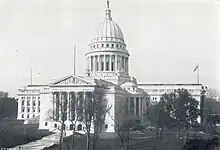| 69th Wisconsin Legislature | |||||
|---|---|---|---|---|---|
| |||||
 Wisconsin State Capitol ca.1915 | |||||
| Overview | |||||
| Legislative body | Wisconsin Legislature | ||||
| Meeting place | Wisconsin State Capitol | ||||
| Term | January 3, 1949 – January 1, 1951 | ||||
| Election | November 2, 1948 | ||||
| Senate | |||||
| Members | 33 | ||||
| Senate President | George M. Smith (R) | ||||
| President pro tempore | Frank E. Panzer (R) | ||||
| Party control | Republican | ||||
| Assembly | |||||
| Members | 100 | ||||
| Assembly Speaker | Alex L. Nicol (R) | ||||
| Party control | Republican | ||||
| Sessions | |||||
| |||||
The Sixty-Ninth Wisconsin Legislature convened from January 12, 1949, to September 13, 1949, in regular session.[1]
This session saw the first legislative terms of Gaylord Nelson, Patrick Lucey, Ruth Bachhuber Doyle, and Robert T. Huber, all of whom would—over the course of the subsequent two decades—play important roles in the transition of the Democratic Party of Wisconsin from a permanent minority party to competitive status with the state Republican Party, by winning over many former Wisconsin Progressive Party voters.
Senators representing even-numbered districts were newly elected for this session and were serving the first two years of a four-year term. Assembly members were elected to a two-year term. Assembly members and even-numbered senators were elected in the general election of November 2, 1948. Senators representing odd-numbered districts were serving the third and fourth year of a four-year term, having been elected in the general election of November 5, 1946.[1]
Major events
- January 3, 1949: Second inauguration of Oscar Rennebohm as Governor of Wisconsin.
- January 20, 1949: Second inauguration of Harry S. Truman as President of the United States.
- April 4, 1949: The North Atlantic Treaty was signed by representatives of twelve countries, including the United States, establishing the NATO defensive alliance.
- April 5, 1949: 1949 Wisconsin Spring election:
- Edward J. Gehl was elected to the Wisconsin Supreme Court.
- Wisconsin voters ratified an amendment to the state constitution to allow the state to take on debt to pay for veterans' housing.
- Wisconsin voters rejected an amendment to the state constitution to repeal the prohibition on taxing federal lands.
- June 19, 1949: Wisconsin Supreme Court justice John D. Wickhem died in office.
- August 29, 1949: The Soviet Union held their first succerssful atomic bomb test.
- July 14, 1949: Wisconsin Governor Oscar Rennebohm appointed Timothy Brown to the Wisconsin Supreme Court, to succeed the deceased justice John D. Wickhem.
- October 1, 1949: Mao Zedong proclaimed the establishment of the People's Republic of China.
- December 7, 1949: The government of the Republic of China retreated to the island of Taiwan and declared Taipei to be their new capital.
- June 25, 1950:
- Forces of the Korean People's Army began an invasion of the Republic of Korea, initiating the Korean War.
- The United Nations Security Council unanimously adopted United Nations Security Council Resolution 82, condemning North Korea's invasion of South Korea.
- June 27, 1950: U.S. president Harry Truman ordered U.S. forces to the defense of the Republic of Korea.
- October 19, 1950: Chinese forces joined the Korean War, supporting North Korea.
- November 7, 1950: 1950 United States general election:
- Walter J. Kohler Jr. elected Governor of Wisconsin.
- Alexander Wiley re-elected United States senator from Wisconsin.
Major legislation
- August 11, 1949: An Act ... relating to discontinuing the Wisconsin veterans' authority and transferring its functions to the department of veterans' affairs, a veterans' housing trust fund, veterans' housing loans, incentive grants for veterans' housing and making appropriations, 1949 Act 627. Utilized the recently ratified amendment to the state constitution to create new veterans programs.
- 1949 Joint Resolution 1: Second legislative passage of a proposed amendment to the state constitution to enable the state to take on debt to pay for veterans' housing. This amendment was ratified by voters at the April 1949 election.
- 1949 Joint Resolution 2: Second legislative passage of a proposed amendment to the state constitution to repeal a portion of the constitution which had prohibited taxing land owned by the federal government. This amendment was rejected by voters at the April 1949 election. But the same amendment was later ratified in 1951.
Party summary
Senate summary

| Party (Shading indicates majority caucus) |
Total | ||||
|---|---|---|---|---|---|
| Dem. | Prog. | Rep. | Vacant | ||
| End of previous Legislature | 5 | 1 | 27 | 33 | 0 |
| Start of Reg. Session[note 1] | 4 | 0 | 27 | 31 | 2 |
| From Mar. 4, 1949[note 2] | 26 | 31 | 2 | ||
| From Apr. 5, 1949[note 3] | 6 | 32 | 1 | ||
| Final voting share | 18.75% | 81.25% | |||
| Beginning of the next Legislature | 7 | 0 | 26 | 33 | 0 |
Assembly summary

| Party (Shading indicates majority caucus) |
Total | |||
|---|---|---|---|---|
| Dem. | Rep. | Vacant | ||
| End of previous Legislature | 12 | 87 | 98 | 1 |
| Start of Reg. Session | 26 | 74 | 100 | 0 |
| From Apr. 5, 1949[note 4] | 25 | 99 | 1 | |
| From Jul. 23, 1949[note 5] | 73 | 98 | 2 | |
| From Dec. 9, 1949[note 6] | 24 | 97 | 3 | |
| From Apr. 13, 1950[note 7] | 72 | 96 | 4 | |
| Final voting share | 25% | 75% | ||
| Beginning of the next Legislature | 24 | 76 | 100 | 0 |
Sessions
- Regular session: January 12, 1949 – September 13, 1949
Leaders
Senate leadership
- President of the Senate: George M. Smith (R)
- President pro tempore: Frank E. Panzer (R–Oakfield)
- Majority leader: Warren P. Knowles (R–New Richmond)
Assembly leadership
- Speaker of the Assembly: Alex L. Nicol (R–Sparta)
- Majority leader: Vernon W. Thomson (R–Richland Center)
- Minority leader: Leland McParland (D–Milwaukee)
Members
Members of the Senate
Members of the Senate for the Sixty-Ninth Wisconsin Legislature:[2]

Members of the Assembly
Members of the Assembly for the Sixty-Ninth Wisconsin Legislature:[2]


Committees
Senate committees
- Senate Standing Committee on Agriculture and Conservation – M. Olson, chair
- Senate Standing Committee on Committees – J. Miller, chair
- Senate Standing Committee on Contingent Expenditures – B. Gettelman, chair
- Senate Standing Committee on Education and Public Welfare – R. P. Robinson, chair
- Senate Standing Committee on Highways – J. Miller, chair
- Senate Standing Committee on the Judiciary – G. W. Buchen, chair
- Senate Standing Committee on Labor and Management – G. A. Bubolz, chair
- Senate Standing Committee on Legislative Procedure – F. E. Panzer, chair
- Senate Standing Committee on State and Local Government – R. Schlabach, chair
- Senate Standing Committee on Veterans Affairs – M. Laird, chair
Assembly committees
- Assembly Standing Committee on Agriculture – O. R. Rice, chair
- Assembly Standing Committee on Commerce and Manufacturing – E. A. Hinz, chair
- Assembly Standing Committee on Conservation – R. S. Travis, chair
- Assembly Standing Committee on Contingent Expenditures – B. Tremain, chair
- Assembly Standing Committee on Education – W. W. Clark, chair
- Assembly Standing Committee on Elections – H. W. Timmer, chair
- Assembly Standing Committee on Engrossed Bills – W. M. Rohan, chair
- Assembly Standing Committee on Enrolled Bills – T. S. Jones, chair
- Assembly Standing Committee on Excise and Fees – H. R. Abraham, chair
- Assembly Standing Committee on Highways – H. A. Harper, chair
- Assembly Standing Committee on Insurance and Banking – F. Pfennig, chair
- Assembly Standing Committee on the Judiciary – V. W. Thomson, chair
- Assembly Standing Committee on Labor – E. L. Genzmer, chair
- Assembly Standing Committee on Municipalities – P. A. Luedtke, chair
- Assembly Standing Committee on Printing – A. F. Betts, chair
- Assembly Standing Committee on Public Welfare – E. W. Hanson, chair
- Assembly Standing Committee on Revision – E. W. Hanson, chair
- Assembly Standing Committee on Rules – J. Spearbraker, chair
- Assembly Standing Committee on State Affairs – B. J. Gehrmann, chair
- Assembly Standing Committee on Taxation – M. F. Burmaster, chair
- Assembly Standing Committee on Third Reading – C. E. Nelson, chair
- Assembly Standing Committee on Transportation – R. Bice, chair
- Assembly Standing Committee on Veterans and Military Affairs – M. Catlin, chair
Joint committees
- Joint Standing Committee on Finance – F. B. Porter (Sen.) & A. R. Ludvigsen (Asm.), co-chairs
- Joint Standing Committee on Revisions, Repeals, and Uniform Laws – A. Busby (Sen.) & C. Finch (Asm.), co-chairs
- Joint Legislative Council – M. Laird (Sen.), chair
Employees
Senate employees
- Chief Clerk: Thomas M. Donahue[3]
- Sergeant-at-Arms: Harold Damon
- Assistant Sergeant-at-Arms: Edward R. Stoker
Assembly employees
- Chief Clerk: Arthur L. May[3]
- Assistant Chief Clerk: Robert H. Boyson
- Sergeant-at-Arms: Norris J. Kellman
- Assistant Sergeant-at-Arms: Thomas A. Austin
Notes
- ↑ Democrat Clement J. Zablocki (3rd District) and Republican Charles D. Madsen (29th District) resigned before the start of the session.
- ↑ Republican Edward F. Hilker (21st District) died.
- ↑ Democrats Casimir Kendziorski (3rd District) and John E. Olson (29th District) were sworn in.
- ↑ Democrat Casimir Kendziorski (Milwaukee County) resigned after being elected to the Wisconsin Senate.
- ↑ Republican John D. Heimick (Milwaukee County) died.
- ↑ Democrat William Banach (Milwaukee County) resigned.
- ↑ Republican Glenn W. Birkett (Racine County) died.
References
- 1 2 Barish, Lawrence S.; Lemanski, Lynn, eds. (2021). "Historical Lists" (PDF). State of Wisconsin Blue Book 2021–2022 (Report). Wisconsin Legislative Reference Bureau. pp. 468, 471, 475, 479–480. ISBN 978-1-7333817-1-0. Retrieved August 5, 2023.
- 1 2 Ohm, Howard F.; Kuehn, Hazel L., eds. (1950). "Members of the Legislature". The Wisconsin Blue Book 1950 (Report). Wisconsin Legislative Reference Library. pp. 27–72. Retrieved August 17, 2023.
- 1 2 Ohm, Howard F.; Kuehn, Hazel L., eds. (1950). "The State Government: Legislative Branch". The Wisconsin Blue Book 1950 (Report). Wisconsin Legislative Reference Library. pp. 239–244. Retrieved August 17, 2023.